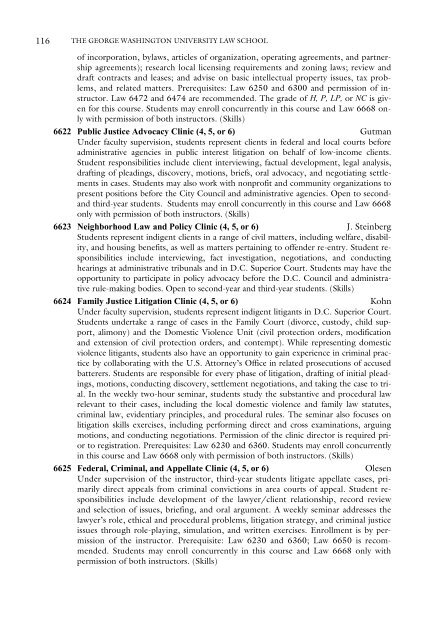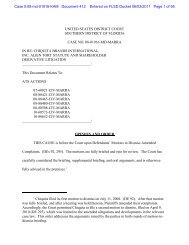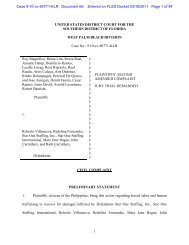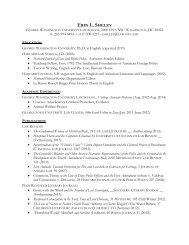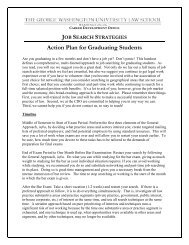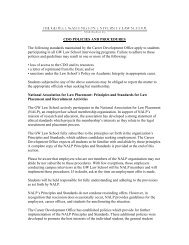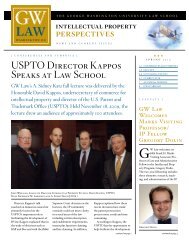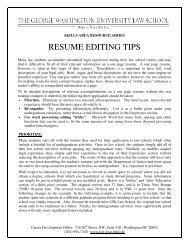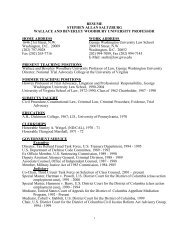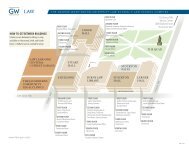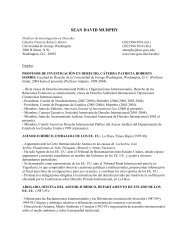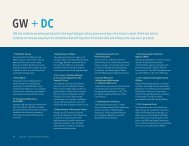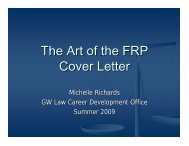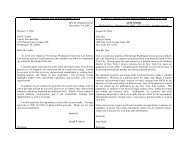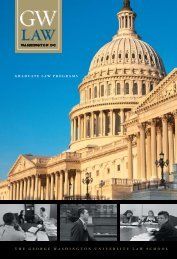The Bulletin - George Washington University Law School
The Bulletin - George Washington University Law School
The Bulletin - George Washington University Law School
- No tags were found...
You also want an ePaper? Increase the reach of your titles
YUMPU automatically turns print PDFs into web optimized ePapers that Google loves.
116 THE GEORGE WASHINGTON UNIVERSITY LAW SCHOOLof incorporation, bylaws, articles of organization, operating agreements, and partnershipagreements); research local licensing requirements and zoning laws; review anddraft contracts and leases; and advise on basic intellectual property issues, tax problems,and related matters. Prerequisites: <strong>Law</strong> 6250 and 6300 and permission of instructor.<strong>Law</strong> 6472 and 6474 are recommended. <strong>The</strong> grade of H, P, LP, or NC is givenfor this course. Students may enroll concurrently in this course and <strong>Law</strong> 6668 onlywith permission of both instructors. (Skills)6622 Public Justice Advocacy Clinic (4, 5, or 6) GutmanUnder faculty supervision, students represent clients in federal and local courts beforeadministrative agencies in public interest litigation on behalf of low-income clients.Student responsibilities include client interviewing, factual development, legal analysis,drafting of pleadings, discovery, motions, briefs, oral advocacy, and negotiating settlementsin cases. Students may also work with nonprofit and community organizations topresent positions before the City Council and administrative agencies. Open to secondandthird-year students. Students may enroll concurrently in this course and <strong>Law</strong> 6668only with permission of both instructors. (Skills)6623 Neighborhood <strong>Law</strong> and Policy Clinic (4, 5, or 6) J. SteinbergStudents represent indigent clients in a range of civil matters, including welfare, disability,and housing benefits, as well as matters pertaining to offender re-entry. Student responsibilitiesinclude interviewing, fact investigation, negotiations, and conductinghearings at administrative tribunals and in D.C. Superior Court. Students may have theopportunity to participate in policy advocacy before the D.C. Council and administrativerule-making bodies. Open to second-year and third-year students. (Skills)6624 Family Justice Litigation Clinic (4, 5, or 6) KohnUnder faculty supervision, students represent indigent litigants in D.C. Superior Court.Students undertake a range of cases in the Family Court (divorce, custody, child support,alimony) and the Domestic Violence Unit (civil protection orders, modificationand extension of civil protection orders, and contempt). While representing domesticviolence litigants, students also have an opportunity to gain experience in criminal practiceby collaborating with the U.S. Attorney’s Office in related prosecutions of accusedbatterers. Students are responsible for every phase of litigation, drafting of initial pleadings,motions, conducting discovery, settlement negotiations, and taking the case to trial.In the weekly two-hour seminar, students study the substantive and procedural lawrelevant to their cases, including the local domestic violence and family law statutes,criminal law, evidentiary principles, and procedural rules. <strong>The</strong> seminar also focuses onlitigation skills exercises, including performing direct and cross examinations, arguingmotions, and conducting negotiations. Permission of the clinic director is required priorto registration. Prerequisites: <strong>Law</strong> 6230 and 6360. Students may enroll concurrentlyin this course and <strong>Law</strong> 6668 only with permission of both instructors. (Skills)6625 Federal, Criminal, and Appellate Clinic (4, 5, or 6) OlesenUnder supervision of the instructor, third-year students litigate appellate cases, primarilydirect appeals from criminal convictions in area courts of appeal. Student responsibilitiesinclude development of the lawyer/client relationship, record reviewand selection of issues, briefing, and oral argument. A weekly seminar addresses thelawyer’s role, ethical and procedural problems, litigation strategy, and criminal justiceissues through role-playing, simulation, and written exercises. Enrollment is by permissionof the instructor. Prerequisite: <strong>Law</strong> 6230 and 6360; <strong>Law</strong> 6650 is recommended.Students may enroll concurrently in this course and <strong>Law</strong> 6668 only withpermission of both instructors. (Skills)


